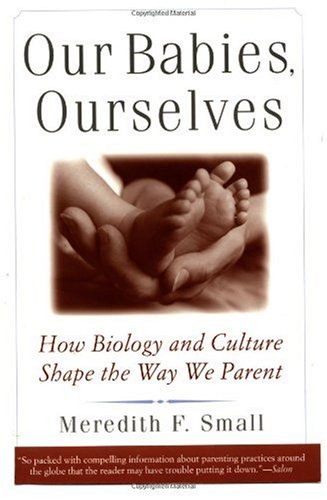The Mother-Infant Dyad
In a more evolutionardy appropriate infant-caretaker scheme, the infant is a social partner, part of a dyad. Both mother and infant are interested in being in equilibrium, that is, in a stable and contented state. This goal is adiieved by mutual regulation, by reciprocity, and by keep¬ ing tabs on each other. This system nicely describes the infant-caretaker pair, and as I have presented in Chapter Two, there is a great deal of evidence that infants and those who love them are attuned to each other and have evolutionarily selected to be so. They are a biological system of interdependence that seeks the same goal—stability. The infant's part in the system is straightforward. It monitors its internal state and then announces any deficiencies, crying for food, warmth, or touch. Crying and smiling are signals of what is right or wrong with the baby's, its equdibrium. And when there is a tilt in the equilibrium, the baby tells the other part of the dyad and seeks reciprocity. The problem comes when die other half of the dyad is not checking in, or is refusing to hold up his or her part of the system; the pact is broken and a mismatch ocoirs. A mismatch, an unanswered signal, is of course not always bad. Think of a tennis game. When one player lobs a ball off to one side of the court, it makes the other player run and reach out, which theoretically pushes the opponent to be a better player in the long run. This view might be applied to the scenario of one type of Western caretaking system—food, touch, and comfort come, but not on an EEA infant-requested schedule. Th( infant-requested schedule. The system is not perfect from the baby's point of view—perhaps a few too many balls are hit out of bounds, and needs are lobbed not when asked—but the interaction does follow some sort of game plan.
Notes:
There is a reciprocal relationship between mother and baby and dysfunction occurs when one side does not reciprocate.
Folksonomies: parenting motherhood babies bonding
Taxonomies:
/sports/tennis (0.577379)
/health and fitness/disease (0.577237)
/technology and computing/software/databases (0.527139)
Keywords:
evolutionardy appropriate infant-caretaker (0.988085 (positive:0.413527)), Mother-Infant Dyad (0.933021 (negative:-0.414090)), EEA infant-requested schedule (0.882522 (neutral:0.000000)), Western caretaking system—food (0.881829 (neutral:0.000000)), reciprocal relationship (0.745124 (negative:-0.414090)), mismatch ocoirs (0.744394 (negative:-0.752015)), contented state (0.729897 (positive:0.665329)), social partner (0.722363 (neutral:0.000000)), mutual regulation (0.698654 (neutral:0.000000)), infant-caretaker pair (0.697578 (positive:0.328257)), great deal (0.696904 (positive:0.643851)), unanswered signal (0.693380 (negative:-0.506219)), internal state (0.680345 (negative:-0.374047)), tennis game (0.671234 (negative:-0.230101)), die other half (0.670727 (negative:-0.734582)), game plan (0.660364 (negative:-0.282859)), long run (0.658040 (negative:-0.419297)), better player (0.657804 (negative:-0.419297)), player run (0.650137 (neutral:0.000000)), baby (0.606693 (negative:-0.369632)), reciprocity (0.576066 (negative:-0.225080)), equilibrium (0.545603 (positive:0.246215)), touch (0.507598 (neutral:0.000000)), interdependence (0.478169 (negative:-0.349258)), warmth (0.469046 (neutral:0.000000)), dysfunction (0.467706 (negative:-0.414090)), pact (0.465441 (negative:-0.752015)), deficiencies (0.463034 (negative:-0.374047)), tilt (0.461858 (neutral:0.000000)), bounds (0.460541 (negative:-0.469728))
Entities:
partner:JobTitle (0.772683 (positive:0.239290)), tennis:Sport (0.507195 (negative:-0.230101))
Concepts:
Infant (0.919079): dbpedia | freebase | opencyc
Infant mortality (0.810634): dbpedia | freebase
Reciprocal (0.809011): dbpedia
Reciprocity (0.720759): dbpedia
English-language films (0.709701): dbpedia
United States (0.696427): website | dbpedia | ciaFactbook | freebase | opencyc | yago
Reciprocation (0.627685): dbpedia
Thermodynamics (0.611038): dbpedia | freebase






